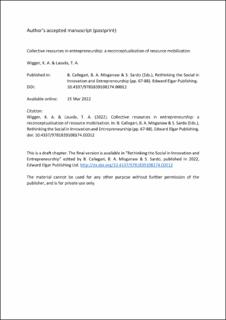| dc.contributor.author | Wigger, Karin Andrea | |
| dc.contributor.author | Lauvås, Thomas Andre | |
| dc.date.accessioned | 2023-02-16T08:14:19Z | |
| dc.date.available | 2023-02-16T08:14:19Z | |
| dc.date.created | 2022-03-29T08:09:39Z | |
| dc.date.issued | 2022 | |
| dc.identifier.citation | Wigger, K. A. & Lauvås, T. A. (2022). Collective resources in entrepreneurship: a reconceptualisation of resource mobilisation. In: B. Callegari, B. A. Misganaw & S. Sardo (Eds.), Rethinking the Social in Innovation and Entrepreneurship (pp. 67-88). Edward Elgar Publishing. doi: | en_US |
| dc.identifier.isbn | 9781839108174 | |
| dc.identifier.uri | https://hdl.handle.net/11250/3051306 | |
| dc.description | Author's accepted version (postprint). | en_US |
| dc.description | This is an Accepted Manuscript of a book chapter published by Edward Elgar Publishing on 15/03/2022. | |
| dc.description | Available online: https://www.elgaronline.com/display/edcoll/9781839108167/9781839108167.00012.xml. | |
| dc.description | The material cannot be used for any other purpose without further permission of the publisher, and is for private use only. | |
| dc.description.abstract | Some resources needed by an entrepreneurial firm to pursue opportunities are collective by nature, which means that these resources are owned and used by more than one actor. Collective resources (e.g., natural resources and resources collectively co-created in networks) cannot simply be bought in a market because of the shared governance, and thus require alternative resource-mobilization approaches, for example through social arrangements. We therefore ask how entrepreneurial firms mobilise collective resources for opportunity exploitation. We conceptually explore the mobilisation of collective resources through utilising theoretical insights from the resource-based view, resource dependence theory and new institutional economics. Additionally, we use examples from the Norwegian salmon farming industry to illustrate different mobilisation approaches for collective resources. We argue that collective resources are mobilised without ownership transfer, which requires for idiosyncratic arrangements to mobilise collective resources. In particular, collective resources often are mobilized through social contracting and institutional arrangements. | en_US |
| dc.description.abstract | Collective resources in entrepreneurship: a reconceptualisation of resource mobilisation | en_US |
| dc.language.iso | eng | en_US |
| dc.publisher | Edward Elgar Publishing | en_US |
| dc.relation.ispartof | Rethinking the social in innovation and entrepreneurship | |
| dc.title | Collective resources in entrepreneurship : a reconceptualisation of resource mobilisation | en_US |
| dc.type | Chapter | en_US |
| dc.type | Peer reviewed | en_US |
| dc.description.version | acceptedVersion | en_US |
| dc.source.pagenumber | 67-88 | en_US |
| dc.identifier.doi | 10.4337/9781839108174.00012 | |
| dc.identifier.cristin | 2013182 | |
